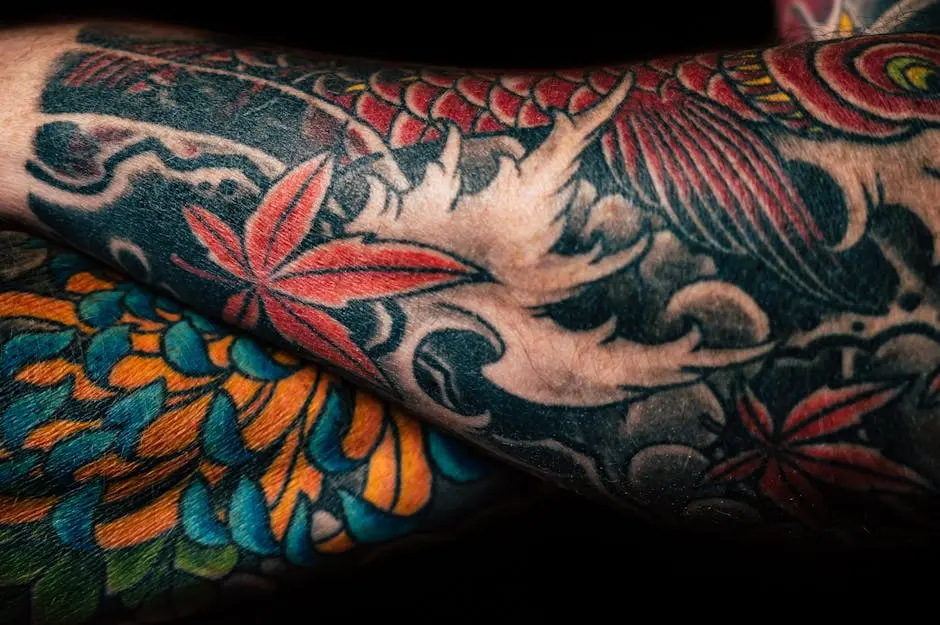Understanding Demon Tattoos
Demon tattoos are intricate designs often depicting powerful and mystical beings from various mythologies. They are chosen by individuals for their aesthetic appeal or symbolic representation.
These tattoos can vary from fierce, intimidating demons to more neutral or even playful interpretations, depending on the individual’s preference and the cultural context they are inspired by.
While some may associate demon tattoos with negative connotations, others see them as embodiments of strength, protection, or a connection to the spiritual realm.
The allure of demon tattoos lies in their ability to convey a sense of mystery, power, or rebellion, making them a popular choice among tattoo enthusiasts seeking unique and meaningful designs.
Whether someone chooses a demon tattoo for its aesthetic value, symbolic meaning, or purely as a form of self-expression, these intricate designs often carry a deeper personal significance for the wearer.
Exploring the Cultural Beliefs
Cultural beliefs surrounding demon tattoos vary widely across different societies and historical periods, influencing how these symbols are perceived and interpreted.
In some cultures, demons are seen as malevolent forces to be feared and avoided, leading to a stigma around tattoos depicting these beings.
Conversely, other cultures embrace demons as protectors, guides, or manifestations of the supernatural, attributing positive qualities to them that can bring good fortune or ward off evil.
The rich tapestry of cultural beliefs surrounding demon tattoos reflects the diversity of human perspectives on spirituality, mythology, and the unseen forces that shape our lives.
For some individuals, getting a demon tattoo may be a way to connect with their cultural heritage, pay homage to ancient beliefs, or simply appreciate the artistry and symbolism behind these mystical beings.
Interpreting Good Luck Symbols
The concept of good luck symbols is prevalent in many cultures worldwide, with each symbol carrying its unique meaning and significance.
While demon tattoos are not commonly associated with luck in mainstream beliefs, some individuals may interpret these symbols differently based on personal experiences or spiritual beliefs.
For those who view demons as protectors or allies, a demon tattoo could be seen as a talisman that brings luck, wards off negative energies, or instills a sense of courage and empowerment.
Ultimately, the interpretation of whether demon tattoos can bring good luck is a deeply personal one, shaped by individual beliefs, experiences, and the cultural context in which the symbolism is understood.
As with any tattoo, the meaning and significance behind a demon design can evolve and change over time, reflecting the wearer’s journey, growth, and evolving perspective on life and spirituality.
Unveiling the Truth
In truth, whether demon tattoos bring good luck or not is a subjective matter influenced by personal beliefs and cultural interpretations.
For some, these tattoos may hold no special significance beyond their visual appeal or aesthetic value, while for others, they can serve as potent symbols of protection, strength, or spiritual connection.
The debate over the luck-bringing abilities of demon tattoos ultimately highlights the complexity and diversity of human perspectives on symbolism, spirituality, and the mystical realms that continue to intrigue and inspire us.
Whether you believe in the luck-imbuing powers of demon tattoos or not, what remains undeniable is the enduring fascination and allure these intricate designs hold for those seeking to express themselves through body art.
So, if you’re considering getting a demon tattoo, let your personal beliefs, values, and motivations guide your decision, ensuring that the design you choose resonates with you on a profound level, whether it brings luck or simply serves as a captivating form of self-expression.


